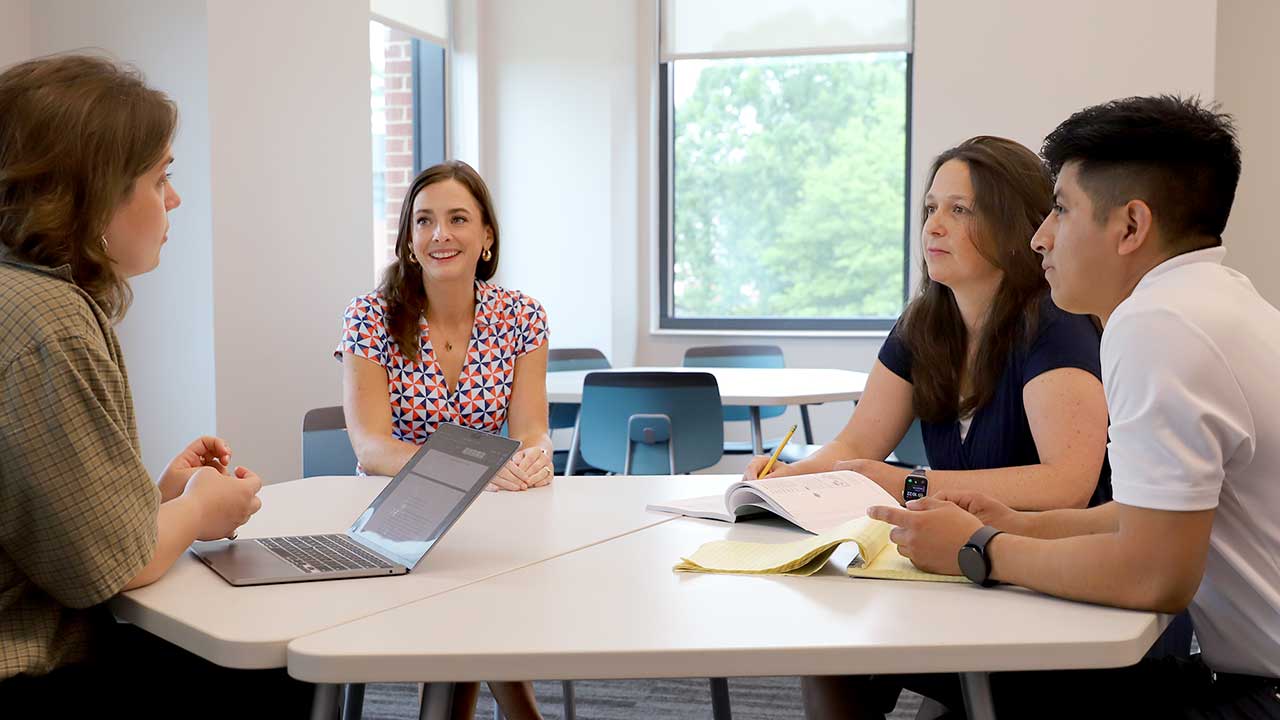content body

In Auburn University’s College of Education, Assistant Clinical Professor Sara Ahnell is opening doors to new cultures, experiences and ways of thinking through her position as program coordinator of Foreign Language Education.
“In my role, I open doors for the teachers I serve by giving them the tools, feedback and confidence to create transformative learning experiences in their Spanish, French and German classrooms,” Ahnell said. “When teachers feel equipped and empowered, they in turn open countless doors for their students to experience connection, understanding and opportunity that can last a lifetime.”
A two-time Auburn graduate, Ahnell earned an undergraduate degree in French and decided to pursue a teaching career. She earned a master’s degree in Foreign Language Education and spent the next 14 years teaching French in Alabama public schools, including Opelika and Auburn high schools. In 2023, Ahnell returned to Auburn for a third time to complete a post-master’s certificate in instructional leadership while also earning a doctorate in curriculum and instruction from Kansas State University that same year.
While teaching high school French, Ahnell also began teaching classroom management for world language teachers in the College of Education’s Department of Curriculum and Teaching in 2013. She transitioned into her current role in 2024, taking on a plethora of responsibilities including teaching courses, supervising interns, advising graduate students and overseeing both undergraduate and graduate programs in Spanish, French and German education.
After experiencing Auburn as both an undergraduate and graduate student, Ahnell said the sense of community and commitment to excellence drew her in, and that during her years in the field, she often met exceptional colleagues who were also trained at Auburn. She found she wanted to help ensure that same level of excellence continues in world language education for future generations of teachers, which inspired her to return to the College of Education as a full-time faculty member.
“Returning as a faculty member was about more than continuing my own journey; it was about serving teachers,” Ahnell said. “I came to Auburn to equip and empower world language educators with the strongest research-based practices and methods so they can best serve the students they teach every day.
“My goal is to help prepare teachers who are not only highly competent and confident in their craft, but also compassionate and reflective teachers who will nurture children to become caring, capable citizens who strengthen their communities for years to come. To me, that mission is far bigger than myself, and I’m honored to be part of it.”
Ahnell said there is a special energy within Auburn’s language education programs, which are rigorous and fast-paced but also collaborative and fun. Her favorite thing about working in the College of Education is building a professional community where teachers—current and future—feel supported, creative and excited about their work.

“Mentoring in-service and aspiring teachers is the most rewarding part of my work,” Ahnell said. “I love helping teachers connect theory to practice and seeing that lightbulb moment when they realize how to make a lesson truly communicative, or when they share that their students are using the language meaningfully and joyfully.”
While serving teachers is a major focus of her work, Ahnell is also dedicated to the overall advancement of world language education. In July, she co-led a global virtual conference with Andy Gillespie of Auburn’s Office of International Programs titled Global Perspectives on the Future of Foreign Language Teaching in K-12 Education: Advocacy, AI, and International Collaboration.
“The event brought together educators, researchers and cultural representatives from around the world to explore how generative AI can enhance instruction while preserving the human connection that makes language learning meaningful,” Ahnell said. “Since then, I’ve been intentional about keeping that conversation going and helping teachers reflect on the future of our profession and how to integrate innovation thoughtfully while staying true to the heart of what we do.”
Ahnell is also preparing to serve on the World Languages Course of Study Committee with the Alabama State Department of Education in 2026. She was selected to join a small, statewide group of educators and stakeholders who will collaboratively review and revise Alabama’s K-12 world languages standards, shaping how languages are taught across the state for the next decade.
Additionally, Ahnell serves as the vice president of the Alabama chapter of the American Association of Teachers of French and is the Alabama State Representative for the National Network for Early Language Learners.
“Both roles allow me to advocate for early and sustained language learning and to support teachers through professional development and collaboration,” she said. “And all of these efforts align with Auburn’s mission to prepare educators who lead with both expertise and empathy, combining deep content knowledge with the human connection that brings language and culture to life.”
Though the landscape of world language education is constantly changing, Ahnell remains confident that Auburn’s College of Education is equipped to prepare future world language educators for whatever challenges they may face.
“Our World Language Education programs are among the most distinctive in the country because they are rigorous, research-based and innovative,” she said. “We prepare teachers to bridge theory and practice through intensive hands-on coaching in designing and implementing communicative, proficiency-based world language instruction.”
Ahnell said she believes graduates of Auburn’s World Language Education programs leave campus ready to open doors for their own students, helping them grow as global citizens through language acquisition.
“We emphasize culturally authentic texts, joyful engagement and genuine human interaction because language learning should feel alive, relevant, and human,” Ahnell said. “Our graduates in language education leave ready to lead classrooms where students do not study a language, but they acquire it, use it and carry it with them for life. When we prepare teachers well, we multiply that impact across generations.”
To learn more about Auburn’s World Language Education programs, visit the College of Education’s website.




